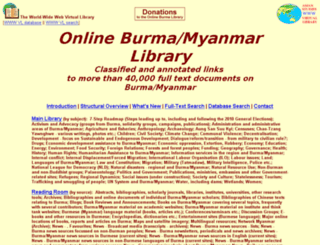Focal point
Location
The Online Burma/Myanmar Library (OBL) is a non-profit online research library mainly in English and Burmese serving academics, activists, diplomats, NGOs, CSOs, CBOs and other Burmese and international actors. It is also, of course, open to the general public. Though we provide lists of Burma/Myanmar news sources, the Library’s main content is not news but in-depth articles, reports, laws, videos and links to other websites, We provide a search engine (database and full text) and an alphabetical list of categories and sub-categories, but the Library is best accessed through browsing the 100 or so categories which lead to sub- and sub-sub categories. These tools should be used in combination.
Members:
Resources
Displaying 806 - 810 of 1151Capitalizing on Conflict: How Logging and Mining Contribute to Environmental Destruction in Burma.
#039;Capitalizing on Conflict' presents information illustrating how trade in timber, gems,
and gold is financing violent conflict, including widespread and gross human rights
abuses, in Burma. Although trade in these “conflict goods” accounts for a small
percentage of the total global trade, it severely compromises human security and
undermines socio-economic development, not only in Burma, but throughout the
region.
Ironically, cease-fire agreements signed between the late 1980s and early 1990s
Burma Human Rights Yearbook 2002-2003: The Situation of Refugees
According to the US Committee for Refugees, there are more than 450,000 Burmese refugees and asylum seekers in countries neighboring Burma. Driven out by the ruling military regimes unrelenting policies and practices that violate their human rights, refugees and aylum seekers have fled to Thailand, Bangladesh, India and Malaysia. The human rights abuses committed by the SPDC include forced relocations, rape, forced labor, torture, the confiscation of land and property, arbitrary arrest and lack of personal security.
Burma Human Rights Yearbook 2002-03: Internally Displaced People and Forced Relocation
The situation of internally displaced people (IDPs), in Burma remained critical throughout 2002. The U.S. State Department’s country report for 2002 on Burma estimated that forced relocations had produced hundreds of thousands of refugees, with as many as one million internally displaced persons.
"Throughout 2002 the military continued to forcibly relocate minority villages, especially in areas where ethnic activists and rebels were active, and in areas targeted for the development of international tourism." (Human Rights Watch World Report 2003)
Landmine chapter of the Burma Human Rights Yearbook 2002-2003
Anti-personnel landmines are victim-activated weapons that indiscriminately kill and maim civilians, soldiers, elderly people, women, children and animals. They can cause injury and death long after the end of hostilities. In Asia, Burma is currently second only to Afghanistan in the number of new landmine victims, surpassing even Cambodia. Contrary to trends in the rest of the world, the SPDC has not signed the Mine Ban Treaty and abstained from the 1999 UN General Assembly vote on the treaty. Of Burma’s 14 states and divisions, 9 of them are affected by landmines.
Burma Human Rights Yearbook 2002-03: The Situation of Migrant Workers
Background:


